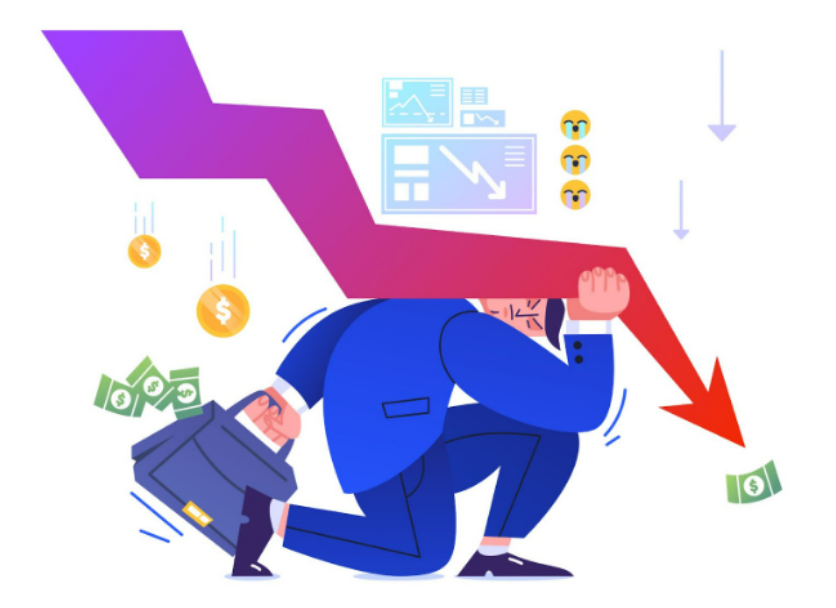
The looming threat of a debt default has caused alarm bells to ring in the White House. According to economists, a default could result in a stock market crash and more than 8 million job losses. These dire projections were published in a blog post by the White House Council of Economic Advisers, emphasizing the high stakes at play. The worst-case scenario, a "protracted" default, could potentially wipe out millions of jobs, reduce GDP by 6.1%, and cause the stock market to crash by nearly half. This would result in a 5 % spike in the unemployment rate, signaling severe damage to the US economy.
The US economy may be heading towards a recession, according to the latest data from The Conference Board's Leading Economic Index. The index has dropped for the 12th consecutive month in March, falling 1.2% to 108.4, indicating that a recession is likely to hit in the middle of 2023. This index tracks business cycles using ten inputs, including manufacturing, unemployment, building permits, and interest rate spreads. It also fell 4.5% in the six months leading up to March, which is steeper than the preceding six-month stretch.
Justyna Zabinska-La Monica, a senior manager at the Conference Board, warns that economic weakness will intensify and spread more widely throughout the US economy in the coming months, leading to a recession. The Wells Fargo economists also point out that the index has seen its sharpest reversal outside of a recession since the 1950s, sending a clear message that a downturn remains ahead.

Source: The Conference Board
In 2023, markets are facing a black swan event due to a recession in the US. The rally across markets has created a dangerous bubble, according to Jeff Bierman, a veteran technical analyst. Bierman has identified five assets - bitcoin, gold, oil, bonds, and S&P 500 stocks - that are moving in tandem with one another in what he calls an "automatic serial correlation." This is a major bearish signal as it suggests overbought conditions in multiple sectors, leaving investors with nowhere to run.
Bierman has also warned that investors are underpricing future risks to the market, with the VIX Index hovering around 17, the lowest value it has measured all year. This is a sign that traders are "sitting on a mountain of complacency" and are not prepared for the potential fallout of a market crash.
The warning comes as earnings season is off to a wobbly start, with big banks mostly beating estimates but other firms reporting disappointing results. Bearish commentators say that earnings expectations are still too high given the current storm of macro headwinds. Morgan Stanley's top stock strategist is predicting the worst earnings recession since 2008 to come over the next few months.
Additionally, a credit crunch in the wake of the March bank turmoil is not helping the outlook for businesses and the economy. This, coupled with the technical signals in the market rally, leaves little room for investors to diversify their portfolios and protect themselves from a market crash.
When the market crashes, it's bad news for investors who have put all their eggs in one basket. The value of their investments can nosedive, leading to significant losses. To make matters worse, those who borrowed money to invest may be forced to sell their holdings at a loss to meet margin calls. But the impact of a market crash isn't limited to just investors. It can have a domino effect on the wider economy, causing businesses to struggle with credit and leading to layoffs and bankruptcies. And when people start losing their jobs, they have less money to spend, causing a vicious cycle of declining economic activity. It's a harsh reminder that when it comes to investing, diversification is key.
India's economy has been on a steady growth trajectory over the past decade, with the country emerging as one of the fastest-growing major economies in the world.
“India is on track to become the world’s third largest economy by 2027, surpassing Japan and Germany. ~ Morgan Stanley”
This growth has not only been fueled by domestic demand, but also by foreign investments in various sectors of the Indian economy. With the recent surge in asset class investments, such as mutual funds, private equity, real estate, and alternative investment funds, investors now have a plethora of opportunities to explore and invest in India. According to a report by JLL India, the market for real estate structured debt products is expected to grow at a compound annual growth rate (CAGR) of around 14% between 2021 and 2025 that highlights the immense potential of the Indian market. From this context, it is very much evident that India's growing economy is providing investors with better opportunities to explore and make higher returns.
Here are some popular asset class investments:
Bottom Line
In today's unpredictable financial climate, portfolio diversification is crucial for consistent returns. With the global economic downturn, it's more important than ever to invest in a high-yielding asset class with stable returns and low risk. Assetmonk's high return fixed income products for investors across the globe offer an exceptional assured IRR of 17% with definite terms, outperforming equity instruments in both volatility and returns. These institutional grade deals are carefully curated from high potential private growth markets, always backed by appreciable asset collateral and monitored by a SEBI-registered trustee. Let Assetmonk's investment advisors guide you toward a diversified investment strategy that ensures peace of mind amidst economic uncertainty.
